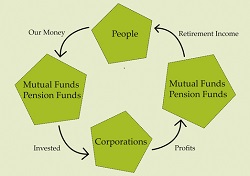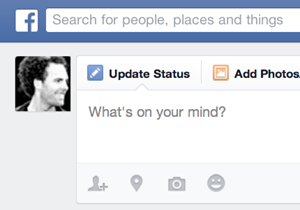|
People, Profits, & Pensions |
|
Facebook: Who's Laughing Now?
Thursday, January 30, 2014
Among those with reason to cheer are several State of Wisconsin funds. They're among the institutional investors who own 58% of Facebook. The State of Wisconsin Investment Board owns just over 2 million FB shares (on September 30, 2013, according to nasdaq.com), a nice thought with the price of those shares up more than $7 in the first hour of trading this morning. The Investment Board manages three state funds, the biggest (93%) of which is the Wisconsin Retirement System (WRS). According to the WRS website (January 30, 2014), "Participants include current and former employees of Wisconsin’s state agencies and most local governments other than the City of Milwaukee and Milwaukee County." As for Facebook's earnings, here are some of the highlights, taken from a company news release:
The Bigger Picture:Will Profits from Big Macs Add to Your Retirement Income?In 1948, the McDonald brothers redesigned and remodelled their drive-in restaurant in San Bernardino, California. Taking inspiration from Henry Ford's assembly-line, they created the fast food revolution, with the quick service and low prices we now take for granted. In that same year, the U.S. National Labor Relations Board ruled unions could include pension issues in contract negotiations. That ignited a massive expansion of pension plans. In the 1950s, pension funds started buying stocks, rather than just bonds or their equivalents; in addition mutual funds came of age. With these two developments working, middle class people became owners of big business. At first, their stakes were modest, but steadily growing. And in just a few decades, they gained controlling interests in many large corporations through their funds. Management guru Peter Drucker has called it, "...one of the most startling power shifts in economic history." Now, working people reap the benefits of those investments, collecting much of the profit distributed by McDonald's and other big corporations. Discover how the pieces fit together. In Big Macs & Our Pensions: Who Gets McDonald's Profits? - a new booklet -(about 25-pages), you will:
You may not be among the owners of McDonald's. But if you belong to any pension plan, or contribute to a mutual fund or whole life insurance policy, you likely own pieces of some big corporations. More importantly, though, your retirement income will be bigger and grow more dependably than you would otherwise expect. Big Macs & Our Pensions: Who Gets McDonald's Profits? is now available at Amazon.com
|

The Ownership Cycle
Copyright 2014. Robert F. Abbott, All Rights
Reserved.
|

 By: Robert F. Abbott, author of
By: Robert F. Abbott, author of  In the months following its IPO (Initial Public Offering), Facebook (FB) took a tumble, and
critics said it might never get up again. But, with this morning's response to yesterday's earnings, its
shareholders must feel vindicated, again.
In the months following its IPO (Initial Public Offering), Facebook (FB) took a tumble, and
critics said it might never get up again. But, with this morning's response to yesterday's earnings, its
shareholders must feel vindicated, again.